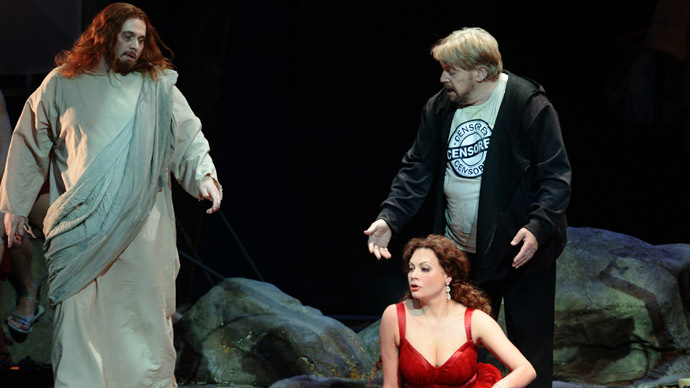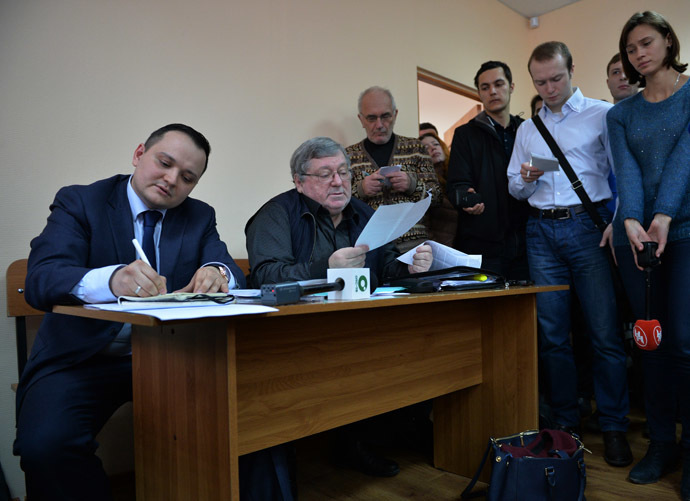‘Forced measure’ – theater boss sacked after church row over Tannhauser opera

The Russian Culture Ministry had to replace the general director of Novosibirsk Opera Theater because the recent row with the Orthodox Church over a controversial opera staging led to a conflict in society, a senior Kremlin official has said.
Magomedsalam Magomedov, deputy head of the Presidential Administration, told reporters Monday that the ministry’s decision was forced by an unprecedented public reaction.
“This interpretation of Wagner was disliked by a great number of people and insulted the feelings of believers, which we should not permit. I think that we have no right to stage works that insult a part of our population and insult their feelings,” he said.
“In future we should see to the fact that all important theaters stage works that are aimed at uniting our people, and not those that split society,” Magomedov added.
Also on Monday, President Vladimir Putin’s press secretary, Dmitry Peskov, dismissed allegations that stricter control over the state-funded cultural establishment was similar to censorship. “The state has the right to expect that the theater collectives would stage the variants of plays that would not cause such acute reaction from public opinion,” Peskov said.
On Sunday, Culture Minister Vladimir Medinskiy also said in a televised interview that in his opinion the actions of cultural establishments must not cause any strife in society, or become the cause for court cases or street rallies, especially if the establishments in question receive their funding from the state.
The comments came shortly after media reports about the sacking of Boris Mezdrich from the post of general director of the Novosibirsk Opera Theater. The move came after a scandal erupted over the theater’s modern interpretation of Wagner’s Tannhauser, which caused the ire of the local diocese of the Russian Orthodox Church.
The staging, prepared by director Timofey Kulyabin, moved Wagner’s romantic story of a medieval knight into the modern day. The main character, Tannhauser, became a film director who was shooting a movie about the life of Jesus Christ in which the Savior lives in carnal sin with the goddess Venus. The believers were especially upset by a poster advertising the opera, which depicted a crucifix placed between a woman’s legs.
In January, Novosibirsk Bishop Tikhon asked regional prosecutors to instigate a criminal case against the director and theater officials who allowed the staging. The cleric claimed that it was violating the Russian law that forbids publicly insulting the religious feelings of other citizens. Violators of the law, introduced in 2013, can face up to three years in prison.

The prosecutors started a probe against Mezdrich and Kulyabin, but only instigated an administrative case against them on charges of public desecration of religious attributes or literature. On March 10, a district magistrate in Novosibirsk cleared both suspects and ordered a halt to the case “due to the absence of the corpus delicti.”
However, the scandal has already hit the media, and caught a public furor. Actors, artists and the liberal public in Siberia and across Russia have launched a petition in defense of embattled theater personalities, while Orthodox activists organized a 3,000-strong rally near the theater, demanding stronger protection for their religious feelings.
The decision to sack Mezdrich was announced soon after the rally. He has told reporters that he was not planning to contest his firing.
The newly appointed general director of the theater, Vladimir Kekhman, said in a press interview that he intended to return the establishment to its initial historical name, the Bolshoi Theater of Siberia.
In mid-March, the Interfax news agency reported that Kulyabin had been invited to work at the Bolshoi Theater in Moscow, had accepted the offer and will start working in the next season. The Bolshoi has confirmed the talks with Kulyabin, and promised to make a statement in May.
On Monday, a Culture Ministry statement said that Mezdrich’s sacking was caused by his unwillingness to consider the traditional values accepted in society, by a lack of respect for public opinion and for refusing to follow the recommendations of the theater’s sponsors.
The ministry also called on the Novosibirsk Diocese to withdraw its criminal complaint over the opera. “The issues of creativity and artistic images must not be discussed at mass rallies or, which is even worse, in courts. We ask the leaders of the Novosibirsk Diocese to retract their address to prosecutors and ask them to hold all future discussions in format of mutually respectful dialogue,” the release reads.












